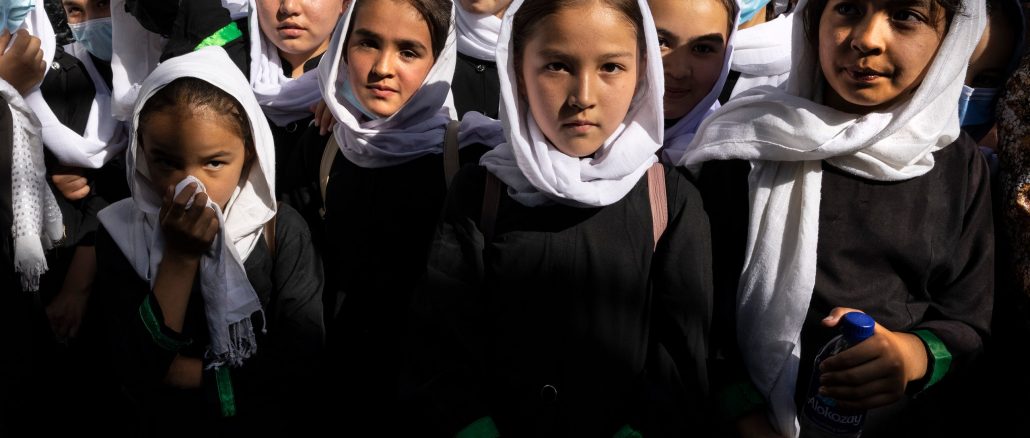
[dropcap]S[/dropcap]ince the end of the Taliban’s rule in Afghanistan in 2001, women had begun to regain their rights. Since they resumed their position of power in 2021, women’s basic human rights are at stake.
Under the Taliban rule from 1996 through to 2001, women did not have the right to education or the right to work. When the Taliban led government toppled, enrolment of female students in primary schools rose from 0% to approximately 80%.
Sher Mohammed Abbas Stanikzai, the senior Taliban leader told BBC Pashto Service that there may not be a place for women in a future Taliban-run government. The United Nations High Commissioner for Human Rights, Michelle Bachelet has expressed deep concern for the future of female education under the Taliban.
On September 18th, the Ministry of Education led by the Taliban announced that all male students from grades 7 to 12 would be returning to school along with only male teachers. Female students are prohibited from being taught by male professors under Taliban rule.
Initially the Taliban’s Minister for Higher Education had stated that girls would be given equal access to education in a gender segregated setting. While younger girls have returned to their studies in segregated classes, it remains unclear when education for older girls and women will resume.
The United Nations children’s agency UNICEF stated, “it is critical that all girls, including older girls are able to resume their education without any further delays. For that, we need female teachers to resume teaching.”
Mahbouba Seraj, CEO of the Afghan Women’s Network and human rights activists told CNN’s Nic Robertson, “everything that we knew, everything that we built especially the women, everything is at stake right now.”
“We are actually facing situations that we are so disliked by a group of people who are actually running this country. They can’t even look at us,” she said.
Speaking at a news conference in Kabul, Zabihullah Mujahid, the Taliban government spokesperson announced the newly appointed all-male government.
Mujahid defended the government decision, stating that women might be added to cabinet at a later date. He requested that the international community needs to recognise the Taliban government before the Taliban government would address human rights concerns.
“It is the responsibility of the United Nations to recognise our government and for other countries including European, Asian and Islamic countries to have diplomatic relations with us,” said Mujahid.
The Ministry for the Propagation of Virtue and the Prevention of Vice replaced the Women’s Affairs Ministry last week. Many male government employees have been called back to work while women have been warned to stay at home because of security issues.
Women across Afghanistan have been unable to return to work since the Taliban resumed power in August. Among these women include female judges and prosecutors who now fear for their lives.
They face threats from the Taliban and from prisoners who have been imprisoned on charges from domestic violence to murder. Many of those imprisoned have been released by the new government.
Zarifa Ghafari, Afghanistan’s first female mayor was forced to flee the country as her car was confiscated by the Taliban and her guards were beaten.
Banu Negar, a pregnant ex police officer was beaten and shot dead in front of her family at her home in Chagcharan. The Taliban have claimed no responsibility for her death, but witnesses have claimed otherwise.
Afghanistan is among one of the most dangerous countries in the world to be a journalist. Journalists have been arrested and detained as they covered protests. They have reportedly been beaten to the point that they were unable to walk. This is the reality for journalists there following the Taliban takeover.
The Taliban-led government announced a new dress code for all female students and teachers at college or private universities stating that they must observe hijab.
In an organised demonstration at Kabul University, 300 women wore all-black garments that covered their faces in support of the Taliban’s decision. This raised fear for women that the restrictions from 20 years ago would be re-enforced.
Dr. Bahar Jalali, who teaches the history of the modern Middle East with a focus on Afghanistan, women’s rights and modernisation started the social media trend “#Donottouchmyclothes” in response to the demonstration.
Throughout the Taliban’s first period of rule over the region in the 1990s, Afghans struggled to communicate the conditions they were living in. In 2021, the aid of social media has proved to be a powerful tool in reaching a worldwide audience.
Hundreds of Afghan women have shared pictures across social media of them wearing their traditional clothing. The traditional clothing displayed across the internet showed an array of colourful outfits, a far cry from the all-black conservative clothing mandated by the Taliban.
There are 14 recognised ethnic groups living in Afghanistan, and a move to the proposed conservative dress code would strip these groups of their identities and rights.
In a statement published by the UN, Michelle Bachelet stated, “first and foremost , women and girls must have full and equal access to essential services, including healthcare and education; be able to work in every sector of the economy; be free to move without restrictions and live free of all gender-related violence.”
Kathleen Keane
Image Credit: Vogue



